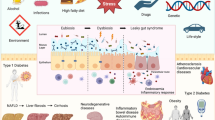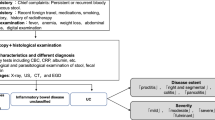Opinion statement
Probiotics are live, microbial food supplements that benefit the host animal by improving intestinal microbial balance. Their major role in preventing and treating gastrointestinal disease appears to be from their effect on the immune process, protection against abnormal invasive bacteria, and in the production of short-chain fatty acids from starch and non-starch polysaccharides. Probiotic microorganisms are administered in food supplements and yogurts. They are also now sold in the form of capsules and powders. There is great variation in the microorganisms in the various supplements. It is important to understand that all probiotic products are different. Some contain a single organism and others contain multiple organisms. Therapeutic results have been achieved with various probiotics in different diseases. In the treatment of inflammatory bowel diseases (IBD), success has been reported with Escherichia coli Nissle strain in ulcerative colitis, and with a multiple organism product, VSL#3 (VSL Pharmaceuticals, Fort Lauderdale, FL), in Crohn’s disease and pouchitis. Initial reports in irritable bowel syndrome (IBS) have resulted in encouraging results with the use of E. coli Nissle strain, and recently with multiple organism probiotic supplements. However, caution must still apply to the use of probiotics in IBD and IBS because the reports and the number of patients treated are limited.
Similar content being viewed by others
References and Recommended Reading
Floch MH, Hong-Curtiss J: Probiotics and functional foods in gastrointestinal disorders. Curr Gastro Rep 2001, 3:343–350.
Metchnikoff E: The Prolongation of Life: Optimistic Studies. London: Butterworth-Heinemann; 1907.
Rodloff AC, Hillier SL, Moncla BJ: Peptostreptococcus, propinonibacterium, pactobacillus, actinomyces, and other non-spore-forming anaerobic gram-positive bacteria. In Manual of Clinical Microbiology, edn 7. Edited by by Murray PR, Baron EJ, Pfaller MS. Washington DC: ASM Press; 1999:672–689.
Holzapfel WH, Haberer P, Geisen R, et al.: Taxonomy and important features of probiotic microorganisms in food and nutrition. Am J Clin Nutr 2001, 73(suppl):365S-373S.
Harmsen HJ, Welling GW: Fluorescence in situ hybridization as a tool in intestinal bacteriology. In Probiotics and Prebiotics: Where Are We Going? Norfolk, England: Caister Academic Press; 2002:41–58.
Matsuki T, Watanabe K, Tanaka, R: Genus- and speciesspecific PCR primers for the detection and identification of bifidobacteria. In Probiotics and Prebiotics: Where Are We Going? Norfolk, England: Caister Academic Press; 2002:85–105.
Sanders ME, Klaenhammer TR: The scientific basis of Lactobacillus acidophilus NCFM functionality as a probiotic. J Dairy Sci 2001, 84:319–331. Lactobacillus acidophilus NCFM produces antimicrobial compounds, is used to decrease pediatric diarrhea, and in adequate daily doses can facilitate lactose digestion. It is available in many conventional foods such as milk, yogurt, and dietary supplements.
Gionchetti P, Rizzello F, Venturi A, et al.: Oral bacteriotherapy as maintenance treatment in patients with chronic pouchitis: a double-blind, placebo-controlled trial. Gastroenterology 2000, 119:305–309.
Nobaek S, Johansson ML, Molin G, et al.: Alteration of intestinal microflora is associated with reduction in abdominal bloating and pain in patients with irritable bowel syndrome. Am J Gastroenterol 2000, 95:1231–1238. The probiotic Lactobacillus plantarum was effective in reducing bloating and pain in classic irritable bowel syndrome.
Kruis W, Kalk EK, Stolte M, et al.: Maintenance of remission in ulcerative colitis is equally effective with Escherichia coli Nissle 1917 and with standard mesalamine. Gastroenterology 2001, 120:A127.
Isolauri E, Sütas Y, Kankaapää P, et al.: Probiotics: effects on immunity. Am J Clin Nutr 2001, 73(suppl):444S-450S. Differences exist in the immunomodulary regulatory effect of various probiotics in healthy subjects and patients with inflammatory diseases. Probiotics can be used to alleviate intestinal inflammation.
Rutgeerts P, D’Haens G, Targan S, et al.: Efficacy and safety of retreatment with anti-tumor necrosis factor antibody (infliximab) to maintain remission in Crohn’s disease. Gastroenterology 1999, 117:761–769.
Borruel N, Carol M, Casellas F, et al.: Increased mucosal tumour necrosis factor z production in Crohn’s disease can be downregulated ex vivo by probiotic bacteria. Gut 2002, 51:659–664.
Li Z, Yang S, Lin H, et al.: Probiotics and antibodies to TNF inhibit inflammatory activity and improve nonalcoholic fatty liver disease. Hepatology 2003, 37:1–9.
Sheih YH, Chiang BL, Wang LH, et al.: Systemic immunity-enhancing effects in healthy subjects following dietary consumption of the lactic acid bacterium Lactobacillus rhamnosus HN001. J Am Coll Nutr 2001, 20:149–156.
Nejdfors P, Wang Q, Ekelund M, et al.: Increased colonic permeability in patients with ulcerative colitis: an in vitro study. Scand J Gastroenterol 1998, 33:749–753.
Söderholm JD, Peterson KH, Olaison G, et al.: Epithelial permeability to proteins in the noninflamed ileum of Crohn’s disease? Gastroenterology 1999, 117:65–72.
Mangell P, Nejdfors P, Wang M, et al.: Lactobacillus plantarum 299v inhibits Escherichia coli-induced intestinal permeability. Dig Dis Sci 2002, 47:511–516.
Naruszewicz M, Johansson ML, Zapolska-Downar D, Bukowska H: Effect of Lactobacillus plantarum 299v on cardiovascular disease risk factors in smokers. Am J Clin Nutr 2002, 76:1249–1255. Lactobacillus plantarum feeding as a supplement can be recovered from stool, and in this study is shown to reduce cardiovascular risk factors by production of short-chain fatty acids from carbohydrate fermentation.
Duggan C, Gannon J, Walker WA: Protective nutrients and functional foods for the gastrointestinal tract. Am J Clin Nutr 2002, 75:789–808.
Hasler CM: Functional foods: benefits, concerns and challenges-a position paper from the American Council on Science and Health. Am Soc Nutr Sci 2002, 3772–3781.
Kruis W, Schutz E, Fric P, et al.: Double-blind comparison of an oral Escherichia coli preparation and mesalazine in maintaining remission of ulcerative colitis. Aliment Pharmacol Ther 1997, 11:853–858.
Rembacken BJ, Snelling AM, Hawkey PM, et al.: Nonpathogenic Escherichia coli versus mesalazine for the treatment of ulcerative colitis: a randomised trial. Lancet 1999, 354:635–639.
Schultsz C, Van Den Berg FM, Kate FW, et al.: The intestinal mucus layer from patients with inflammatory bowel disease harbors high numbers of bacteria compared with controls. Gastroenterology 1999, 117:1089–1097.
Kleessen B, Kroesen AJ, Buhr HJ, Blaut M: Mucosal and invading bacteria in patients with inflammatory bowel disease compared with controls. Scand J Gastroenterol 2002, 37:1034–1041.
Seksik P, Rigottier-Gois L, Gramet G, et al.: Alterations of the dominant faecal bacterial groups in patients with Crohn’s disease of the colon. Gut 2003, 52:237–242.
Swidsinski A, Ladhoff A, Pernthaler A, et al.: Mucosal flora in inflammatory bowel disease. Gastroenterology 2002, 122:44–54.
Hart AL, Stagg A, Kamm MA: Use of probiotics in the treatment of inflammatory bowel disease. J Clin Gastroenterol 2003, 36:111–119. Meta-analysis reveals probiotics can be effective in the treatment of inflammatory bowel disease. A variety of organisms were used in studies in ulcerative colitis, pouchitis, and Crohn’s disease, with the analysis showing overall success.
Plein K, Hotz J: Therapeutic effects of Saccharomyces boulardii on mild residual symptoms in a stable phase of Crohn’s disease with special respect to chronic diarrhea—a pilot study. Z Gastroenterol 1993, 31:129–134.
Guslandi M, Messi G, Sorghi M, Testoni PA: Saccharomyces boulardii in maintenance treatment of Crohn’s disease. Dig Dis Sci 2000, 45:1462–1464.
Pantera C, Scribano ML, Falasco G, et al.: Ineffectiveness of probiotics in preventing recurrence after curative resection for Crohn’s disease: a randomized controlled trial with Lactobacillus GG. Gut 2002, 51:405–409.
Campieri M, Rizzello F, Venturi A, et al.: Combination of antibiotic and probiotic treatment is efficacious in prophylaxis of post-operative recurrent of Crohn’s disease: a randomised controlled study versus mesalazine. Gastroenterology 2000, 118:A781.
Mimura T, Rizzello F, Schreiber S, et al.: Once daily high dose probiotic therapy maintains remission and improves quality of life in patients with recurrent or refractory pouchitis: a randomised, placebo-controlled, double-blind trial. Gastroenterology 2002, 122:A81.
Ulisse S, Gionchetti P, D’Alò S, et al.: Expression of cytokines, inducible nitric oxide synthase, and matrix metalloproteinases in pouchitis: effects of probiotic treatment. Am J Gastroenterol 2001, 96:2691–2699.
Sen S, Mullan MM, Parker TJ, et al.: Effect of Lactobacillus plantarum 299v on colonic fermentation and symptoms of irritable bowel syndrome. Dig Dis Sci 2002, 47:2615–2620.
Kim HJ, Camilleri M, McKinzie S, et al.: Effect of a probiotic, VSL#3, in diarrhea-predominant irritable bowel syndrome: a randomized, double blind, placebo controlled trial. Am J Gastroenterol 2002, 97:A177.
Faber SM: Irritable bowel syndrome and reinoculation with probiotics. Am J Gastroenterol 2002, 97:A211.
Author information
Authors and Affiliations
Rights and permissions
About this article
Cite this article
Floch, M.H. Probiotics, irritable bowel syndrome, and inflammatory bowel disease. Curr Treat Options Gastro 6, 283–288 (2003). https://doi.org/10.1007/s11938-003-0020-y
Issue Date:
DOI: https://doi.org/10.1007/s11938-003-0020-y




